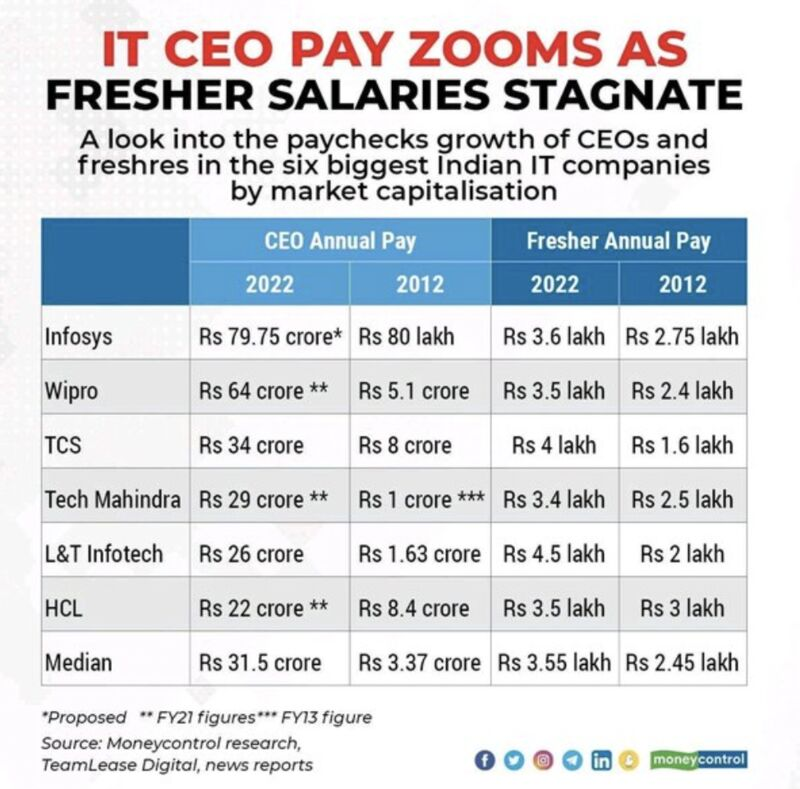What is wrong with this data?

Surely, you will say something like:
- Infosys’ CEO pay has gone up 100 X in 10 years, Wipro’s by 13 X and so on while the entry level salaries have increased by only a few percentage points.
- In 2012, the CEO’s pay at Infosys was 290 times. In 2022, it is 2,222 times! In another words, the inequality gap has just widened.
So what is wrong? This kind of inequality is. just. not. fair.
Thank you for your extremely analytical answer.
—
But what if I ask you a slightly different question: is there anything wrong with this?
You will be puzzled. You just proved it to me with facts that it is wrong and yet I ask you is it wrong?.
—
Let me share my 2 cents.
But before that let me confess it has taken me a few years to go from it is wrong to is it wrong?.
Why do I say this?
Reason 1: Supply and Demand.
The number of graduates seeking a job at Infosys for example vs the jobs at Infosys is mind boggling. And it is worsening. When the Supply of a commodity is far greater than it’s Demand, then prices will be low. Likewise, when Supply of talent is far greater than the Demand for talent, then the prices will be lower. Therefore freshers salaries are likely to remain low for a good time to come. If you don’t want the job because it pays so less, there are literally 100s of others who want it.
On the other hand, the ratio of CEO candidates to CEO jobs is probably in single digits. For example, at Infosys, before Salil Parekh as CEO, there was Vishal Sikka who lasted about 3 years. There was a cultural misalignment between him and the company and hence he left abruptly. Therefore finding the right CEO candidate is much much harder than it seems and that is why I think the ratio of potential CEO candidates to the job is in single digits. I am not counting aspirants; I am counting only the ones that can steer a multi-billion dollar ship, balancing growth and sustainability and that number is likely to be very small. And when you find the right captain, pay is important but not the most important. His or her vision, track record, understanding of technology, connects within the industry and with clients, ability to strike partnerships etc. is far more important.
Infosys, for example, had a revenue of $ 11 B in 2018 and in 2022 had $16 B. (I was going to use the INR figures but my smart readers would have said INR has depreciated vis-a-vis the $ and hence I am forcing the data to fit my narrative.) In the same period, it’s market cap has gone from $ 19 B to 104 B or 5X! Tell me, if a CEO can add that kind of value, would you mind paying him more?

I have no way to ascertain how much to credit Dhoni for India’s win but the captain takes a disproportionate share of credit when the team wins and a disproportionate share of blame when the team loses. Same with the CEO. Which brings me to the next big idea: winner take all.
Reason 2: Winner take all.
Naval Ravikant says that we tend to confuse equal opportunities with equal outcomes. Equal opportunities would mean equal access to education, health care, job opportunties without any kind of discrimination. But outcomes will tend to be a mix of luck, talent, skill, game selection etc. In free market capitalism, you will have extreme outcomes where some players or some people will see a disproportionate benefit. It’s just the way it is. Socialism is an idea based on fairness for all but is far less efficient at wealth creation.
Here are a few more examples of disproportion in every day business life:
- Airlines work hard to keep costs under control but how much profit they’ll make depends on oil prices. Airports on the other hand are like a monopoly and will make profits regardless. Airlines are harder working than Airports, but the latter are disproportionately luckier. (During the pandemic, Lufthansa was flying empty planes to airports to keep its slots at those airports. Clearly, you can see who has the ability to turn the screws and who doesn’t. )
- Hotels work hard to keep costs under control, make their properties amenable etc. On the other hand, the Online Travel Agents (OTAs) just tend to commoditize the hotels; the OTAs tend to make far more profits per unit of effort than the hotels.
- Likewise, the Revenue per hour and the Profit per hour that the CEO makes for the company is 100s or 1000s of times more valued by the economy as compared to that of a fresher. Why then should their pays be the same?
So, my friends, is there something wrong with that image? No.
In fact what would be good for the economy would be several people refusing to accept this pay inequality and starting up and providing employment opportunities to many, many people. But as long as the Supply Demand imbalance persists, this salary gap is likely to widen.
—
Now, if you are a fresher reading this, this might depress you. And I understand. Like I said it took me a few years to see the data in perspective. In a few years, my children would join the workforce. And what I would tell them is what I would tell anybody starting out.
- Don’t waste your time on self pity. Almost everyone starts out as a fresher and so you can work you way up. Key is work.
- Become a learning machine.
- Learn new and more valuable skills. Learn to think better and decide better. Learn to leverage technology. A person I know – Jana Vembunarayan started out as a government clerk but taught himself programming and changed his life. You can learn more about him through his blogs. If he can do it, you can too.
- Learn everything you can about people who think better like Naval Ravikant and Charlie Munger.
- Don’t expect fairness from the world. Yes- taxi drivers are going to overcharge you on a rainy day, air fares are going to go through the roof during holidays, bosses will prefer sycophants even though they will say otherwise, you will be overlooked for promotions many times, presentation is more important than form even though people will say otherwise…all of these things will happen. Don’t waste your time on self pity but instead work on your skills.
- Nobody else cares about your success except yourself, so keep working on yourself regardless.
- And when you do well, help out others. Don’t expect fairness, but be fair yourself. This is what Charlie Munger would do and so should you and I. You can read my blog on Niti and Nyaya on this.
—
Now, go rock the world!

One thought on “On Fairness”